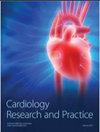Comparison of the Different Anesthesia Strategies for Atrial Fibrillation Catheter Ablation: A Systematic Review and Meta-Analysis
IF 1.8
4区 医学
Q3 CARDIAC & CARDIOVASCULAR SYSTEMS
引用次数: 1
Abstract
Background Catheter ablation has become a widely applied intervention for treating symptomatic atrial fibrillation (AF), which can be performed under general anesthesia (GA), deep sedation, or conscious sedation (CS). But the strategy of anesthesia remains controversial. Objectives This systematic review and meta-analysis aims to compare the advantages of GA/deep sedation and CS in AF catheter ablation, including procedural parameters and clinical outcomes. Methods PubMed, Embase, and the Cochrane Library were searched up to November 2021 for randomized controlled trials and observational studies that assessed the outcomes of catheter ablation under GA/deep sedation or CS. Ten studies were included in this meta-analysis after screening with the inclusion and exclusion criteria. Heterogeneity between studies was evaluated by the I2 index and the Cochran Q test, respectively; sensitivity analysis including meta-regression was performed if heterogeneity was high. Publication bias was assessed using a funnel plot and Egger' test. Results This meta-analysis found GA/deep sedation to be associated with a lower recurrence rate of AF catheter ablation (p=0.03). In terms of procedural parameters, there was no significant difference between the two groups for the procedural time (p=0.35) and the fluoroscopy time (p=0.60), while the ablation time was shorter in the GA/deep sedation group (p=0.008). The total complication rate and the incidence of serious adverse events were statistically insignificant between the two groups (p=0.07 and p=0.94). Meta-regression did not suggest any covariates as an influential factor for procedural parameters and clinical outcomes. Conclusion GA/deep sedation may reduce the risk of recurrence after AF ablation without increasing the incidence of complications. GA/deep sedation shortens the ablation duration, although there is no statistical difference in other procedural parameters between GA/deep sedation and CS.心房颤动导管消融不同麻醉策略的比较:系统回顾和荟萃分析
背景导管消融已成为治疗症状性心房颤动(AF)的一种广泛应用的干预措施,可在全麻(GA)、深度镇静或清醒镇静(CS)下进行。但是麻醉的策略仍然存在争议。本系统综述和荟萃分析旨在比较GA/深度镇静和CS在房颤导管消融中的优势,包括手术参数和临床结果。方法检索PubMed、Embase和Cochrane图书馆截至2021年11月的随机对照试验和观察性研究,评估GA/深度镇静或CS下导管消融的结果。通过纳入和排除标准筛选后,10项研究被纳入本荟萃分析。研究间的异质性分别通过I2指数和Cochran Q检验进行评估;如果异质性高,进行敏感性分析,包括meta回归。采用漏斗图和Egger检验评估发表偏倚。meta分析发现GA/深度镇静与房颤导管消融复发率较低相关(p=0.03)。在手术参数方面,两组手术时间(p=0.35)和透视时间(p=0.60)差异无统计学意义,GA/深度镇静组消融时间更短(p=0.008)。两组患者总并发症发生率、严重不良事件发生率比较,差异均无统计学意义(p=0.07、p=0.94)。meta回归没有显示任何协变量作为程序参数和临床结果的影响因素。结论GA/深度镇静可降低房颤消融后的复发风险,且不增加并发症的发生率。GA/深度镇静缩短了消融时间,但GA/深度镇静与CS在其他程序参数上无统计学差异。
本文章由计算机程序翻译,如有差异,请以英文原文为准。
求助全文
约1分钟内获得全文
求助全文
来源期刊

Cardiology Research and Practice
Medicine-Cardiology and Cardiovascular Medicine
CiteScore
4.40
自引率
0.00%
发文量
64
审稿时长
13 weeks
期刊介绍:
Cardiology Research and Practice is a peer-reviewed, Open Access journal that publishes original research articles, review articles, and clinical studies that focus on the diagnosis and treatment of cardiovascular disease. The journal welcomes submissions related to systemic hypertension, arrhythmia, congestive heart failure, valvular heart disease, vascular disease, congenital heart disease, and cardiomyopathy.
 求助内容:
求助内容: 应助结果提醒方式:
应助结果提醒方式:


